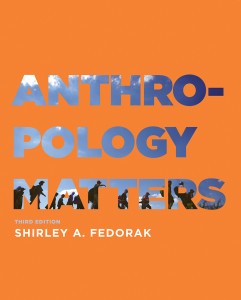Author Shirley A. Fedorak discusses the changes to the new edition of Anthropology Matters and how they are grounded in a need to make anthropology relevant to today’s students.
 My former students at the University of Saskatchewan were the inspiration for Anthropology Matters. They asked questions, difficult questions, about the world around them and what role anthropology could play in solving or at least mitigating social, political, economic, and religious problems. I noted they were not that interested in small-scale cultures, except as a starting point, and this was when I realized anthropology was losing its relevance in the modern world. I set off to discover where the discipline was still relevant and where anthropology could and should become relevant.
My former students at the University of Saskatchewan were the inspiration for Anthropology Matters. They asked questions, difficult questions, about the world around them and what role anthropology could play in solving or at least mitigating social, political, economic, and religious problems. I noted they were not that interested in small-scale cultures, except as a starting point, and this was when I realized anthropology was losing its relevance in the modern world. I set off to discover where the discipline was still relevant and where anthropology could and should become relevant.
Most of the topics in this new edition of Anthropology Matters are global in nature, and some of them originated from my personal and professional experiences in the three countries I have lived in since leaving Canada.
I am grateful that the second edition of Anthropology Matters was so well received, but in this third edition of Anthropology Matters I felt it necessary to bring more of the Middle Eastern world into the text. Three areas stood out: sectarianism, contract slavery, and veiling.
Sectarianism was rife in the two years (2014-2016) I lived in Beirut, Lebanon. It is an extremely damaging system that permeates the everyday lives of Muslim people. My key informants made this point time and again. They live in fear, yet without ties to their sect (Shia, Sunni, or Druze) they cannot survive in Lebanese society. I experienced some restrictions as I worked with my informants and on at least one occasion I was discretely accused of being a spy. The most frustrating part of my research was not being able to use material that might identify my informants and endanger their lives.
Modern-day slavery is an issue I have wanted to investigate for years and it became the topic of a new chapter in Anthropology Matters. The daily abuse and exploitation of domestic workers I witnessed in Lebanon spurred me on, although I also included material on contract slavery in Los Angeles, California, child slavery and child soldiers in Africa, and human trafficking in Canada and Thailand.
These two topics deal with serious problems that are not the sole domain of the Middle East, but I am concerned that some readers will feel this justifies their media-shaped negative perceptions of Middle Easterners. The chapter on purdah and veiling takes a different approach, and despite many of the misperceptions held in the West, veiling is a positive cultural tradition in most Muslim countries. This popular chapter has been in the book since the first edition, but I have enriched the discussion with personal observations and narratives from one of the wisest women I have ever known. Her insights are based on many years of reflection and the reality of being a Muslim woman living in a diverse Muslim country.
The third edition of Anthropology Matters is not simply an update. The global situation is fluid and the issues examined can and do change. Hence, with a couple of exceptions, all of the chapters have been updated and many have been reworked to include new sections. For example, social media has grown increasingly powerful since the second edition, but not necessarily as a forum for overthrowing corrupt governments. The emphasis in the chapter is now on the effect social media, such as Facebook, is having on culture. Keeping with the power and influence of social media, I have included a brief discussion on jihadists employing the internet to recruit people to their cause.
Choosing what chapters must go in order to make room for new chapters is an agonizing task. My secret wish is that the “lost” chapters from the first and second editions will somehow reappear in the future.
The first chapter in the text sets the stage for the study of anthropology and introduces the question of ethics in fieldwork. The following two chapters offer examples of anthropology at work: the role of anthropologists in design and technology environments, featuring Genevieve Bell’s work at Intel, and linguistic anthropologists preserving and revitalizing endangered languages. The second section of the book contains nine socially-engaged topics, often from a cross-cultural perspective. Gender concerns are at the forefront in several of the chapters; female circumcision, ideal body image, veiling, and same-sex marriage are all major chapters.
The theme of this and earlier editions of Anthropology Matters is global citizenship. The issue-based questions are designed to encourage young people to become global citizens by expanding their understanding of the global story. I strongly feel that anthropology stands at the threshold between misperceptions about people and places and real knowledge and understanding. As an educator, I have an obligation to present information that encourages readers to think beyond what they have been told or heard in the media. This is particularly true of the new chapter on conflict and climate displaced persons, which I set up as a moral dilemma. More than any other topic, this one demands that readers consider their role as global citizens. I also raised the question of etymology: are pejorative terms such as “migrant” used to deflect from the catastrophic nature of the transnational flow of human beings, and to cast suspicion on their motives and intentions? These chapters set the tone and the basis for inquiry, but more often than not, open up more questions rather than present definitive answers. My hope is that students become more reflective, able to process and analyze information and see through hyperbole, fake news, and hidden agendas. Now, more than ever before, these skills are desperately needed.
To further stimulate discourse on ethical questions, I added an Issues Box to each chapter. These boxes illustrate a particular point not directly addressed in the chapter. One example is the “Should we free the slaves?” contested moral question in the chapter on modern-day slavery. Another is “Is Islamophobia justified?” in the chapter on displaced persons. In keeping with the theme of this book, most of the Questions for Consideration at the end of each chapter encourage creative and multi-layered thinking. The third edition of Anthropology Matters also includes a downloadable instructor’s manual and test bank.
The purpose and use of this text is flexible; instructors might use it to replace a traditional textbook or as an additional reader to enhance student understanding of current issues. Anthropology Matters can also become the core text for a course in global issues and anthropology.
Writing a book is an exhilarating experience. My own understanding of the global stage has greatly expanded on this journey, and for me, this is the major benefit of researching and writing about how anthropology matters. I look forward to your feedback on the third edition of Anthropology Matters and any suggestions you may have for topics to include in the next edition.
Shirley A. Fedorak has taught at the University of Saskatchewan and the American College of Cairo. She is the author of a number of textbooks including Global Issues: A Cross-Cultural Perspective (2013) and Pop Culture: The Culture of Everyday Life (2009). She now lives in Penang, Malaysia where she continues to write.



